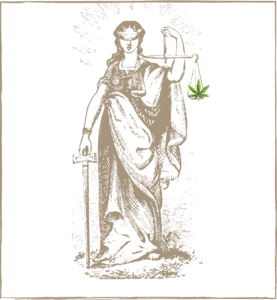Disclaimer: This article contains general analysis of Ohio and federal laws. It should NOT be read as legal advice. If you need legal advice specific to your case or situation, then please call Dearie, Fischer & Mathews or seek the advice of some other attorney.
Introduction
We have written about the topic of marijuana laws in several previous articles. There is, however, much more to say on the topic. There are some differences between federal marijuana laws and the things some of the states allow, including Ohio. We have mentioned some of these discrepancies in previous articles such as “Facts Surrounding Recent Discussion on Federal Marijuana Law.” Another complication with some of the marijuana laws are the chemicals that come from marijuana, which ones are legal, and why some of them are legal while others are not.
Overview
Many Ohioans are already using marijuana legally for medicinal purposes. And while Ohio, like most other States, has a lot of citizens in favor of “decriminalizing” recreational marijuana, there are still quite a number of marijuana uses which are not legal in Ohio. And the federal laws regarding marijuana do not even allow some of the medical marijuana that is legal in Ohio, which can make things a little bit confusing when it starts to become allowed on the state level. In recent years, however, the federal laws themselves have become even more confusing. There are still many widely used forms of marijuana which are illegal to sell, possess, or consume. However, as more and more states make marijuana legal on a state level, the definition of legal hemp product is becoming unclear on a federal level. When making the assessment of whether or not to use hemp products or how much to use, it is good to know the law surrounding the concept. Here we will discuss the current laws on hemp products and how the laws could be changing.

Where Laws on Hemp Get Complex
For decades, it has been on the forefront of the minds of Americans that marijuana is federally illegal. To be more specific, marijuana products which contain an illegal chemical called Tetrahydrocannabinol (THC) are illegal products. At least, that was the rule up until the 2018 Farm Bill. The Farm Bill was very specific in stating that a substance could not be considered a legal hemp product if it contained a greater than 0.3% by volume of a type of THC called Delta-9 THC. Because the Farm Bill was so specific, hemp farmers were able to find a way to extract chemicals from hemp with similar properties and effects to Delta-9 THC which did not fall under the Farm Bill’s definition of illegal marijuana. Products which contain Delta-9 THC do often contain greater than 0.3% and are therefore illegal under federal law. And normally marijuana contains an illegal amount of Delta-9 THC. However, with the new extraction processes being done on hemp farms, some marijuana products contain isomers of Delta-9 THC. When we say isomers of Delta-9 THC, we are talking about substances with very similar chemical makeup to Delta-9 THC, but are not quite the same. Usually the isomers are so similar to Delta-9 THC, they are still THC. Two of the most popular isomers THC are Delta-8 THC and Delta-10 THC.
Is Delta-8 Legal?
So are Delta-10 and Delta 8 THC legal for recreational use? Well… they are not prohibited by the language of the Farm Bill. Ohio does have laws with similar language to the Farm Bill. The Ohio Revised Code 928.01(F) contains this definition for “hemp product:”
“Hemp product” means any product, containing a delta-9 tetrahydrocannabinol concentration of not more than three-tenths per cent, that is made with hemp. “Hemp product” includes cosmetics, personal care products, dietary supplements or food intended for animal or human consumption, cloth, cordage, fiber, fuel, paint, paper, particleboard, and any other product containing one or more cannabinoids derived from hemp, including cannabidiol.
Delta-8 products have become widely and readily available, and for the time being they are not being shut down by law enforcement. Given the situation, Delta-8 and Delta-10 users still need to be very cautious. For one thing, Ohio could decide to ban Delta-8 as several other states have already done. There is also the fact that most Delta-8 is often synthetically derived, which would make it a schedule 1 illegal substance even though it does not contain the prohibited amount of Delta-9 THC. Although it would be possible to have a Delta-8 product containing Delta-8 which is not synthetically derived, it is hard to know how the Delta-8 in a given product was involved. For that reason, or some other reason, the federal government could start enforcing a law saying that Delta-8 THC is illegal.
So while many stores and marijuana users in Ohio have been allowed to treat Delta-8 and Delta-10 as if they are legal for practical purposes, we will stop short of telling our readers that these substances are legal. There is confusion not simply because consumers are confused. There is confusion because the law itself is still in need of clarification. On top of that, consumers do seem to be confused. There are many misconceptions floating around among marijuana users. Some think marijuana has been decriminalized while others think that the delta-8 products are something completely different with no legal concerns surrounding them. In reality, there is still a lot of controversy surrounding Delta-8 and Delta-10, and anything with greater than 0.3% Delta-9 THC is certainly against the law.
When it comes to Delta-8 in medical marijuana, Ohio has allowed medicinal products that contain Delta-8, but has recently begun regulating these medicinal products more heavily.
Considerations on Other Hemp Products
You may have noticed the Revised Code specifically mentioned cannabidiol. This is another chemical derived from hemp which has become quite popular and is widely referred to as CBD. While CBD is not THC, some of the products made with CBD can sometimes also contain THC while other ones do not. While CBD by itself is not prohibited by the 2018 Farm Bill, the legality of CBD products depends on a lot of factors, and many of the CBD products being sold are arguably illegal.
Unfortunately, there is no good answer to the questions of how much or what types of THC products you can use while still being responsible. It is up to the individual to know the effects of the products they consume and the impact the effects will have on their lives and careers. Now that you do not have to find yourself a drug dealer to buy THC, it may not feel like you are taking a risk even though you could be.
You may have even seen hemp products being sold at a gas station. Some gas stations sell CBD products such as CBD cigarettes, or relaxation brownies which often do contain hemp. While it is true that relaxation brownies sometimes use melatonin to help you relax, they are still sometimes hemp products. And then there are the Delta-8 products we discussed above that can sometimes be found at gas stations and convenient stores. Some of these products pose a bigger legal risk than others, but consumers should pay attention to what they are buying and who they are buying from. It is not unheard of that stores are shut down and store owners charged because they were selling illegal products or did not have the proper license.
Hemp Products and Drug Tests
Aside from the legal issues surrounding Delta-8 and other readily available hemp products, you may also have wondered if they can make you fail a drug test. The short answer is – yes! Not all hemp products contain enough THC to show up on a drug test, but some of them do. While the Farm Bill draws a line at 0.3% Delta-9 THC, not all drug tests can necessarily distinguish between Delta-9 THC and its isomers. Even CBD products sometimes contain THC, and medical marijuana can show up on a drug test. Therefore, testing positive for marijuana and using illegal marijuana no longer go hand in hand like they used to. Knowing whether or not a hemp product will make your drug test come up positive for marijuana requires that you do research into the individual product you are using, and how the samples are tested in your particular drug test. If you do not know for sure, then remember it is possible for you to fail a drug test by using certain CBD products or Delta-8 THC (or Delta-10 or any other THC).
How could Ohio Marijuana Laws Be Changing?
There still is a large push in Ohio to make recreational marijuana use legal which would make the Delta-9 distinction irrelevant as far as Ohio law goes. As recently as August 20th, 2021, the Ohio Attorney General approved summary language on a petition to legalize marijuana, which means the proposed law can now begin the process of making its way in front of the Ohio legislature. Until the law is officially enacted by the Ohio Government, however, Ohioans need to be aware that they could suffer major legal consequences from buying, selling, or possessing Delta-9 THC. Prohibited
On the other hand, as we mentioned above, the government may go in the opposite direction with law enforcement shutting down the buying, selling, and possession of THC isomers. They may crack down on Delta-8 because of its tendency to be obtained synthetically, Ohio may join other states in banning Delta-8, or there may be some other law that makes Ohio stricter on hemp products.
Conclusion
The new laws on Hemp have become quite complex, and they will likely continue to change. At Dearie, Fischer & Mathews, our lawyers have worked on cases involving marijuana in Warren County and many other Ohio counties for the past twenty years. We have seen many changes in the law and worked on many cases that were affected by these changes. If you are charged with a violation of marijuana laws, or if you have any other legal concerns, feel free to contact Dearie, Fischer & Mathews.

